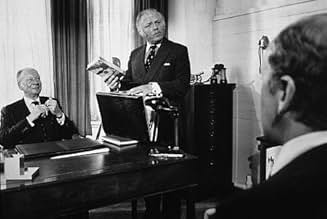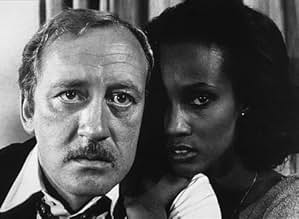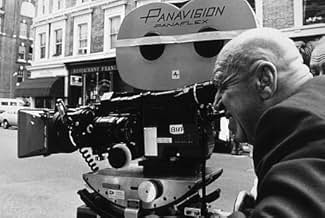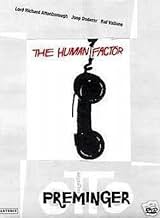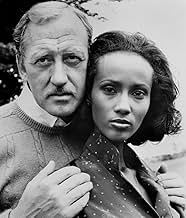NOTE IMDb
6,1/10
1,7 k
MA NOTE
Lorsque l'on découvre que des informations ont fuité dans le service de renseignements britanniques aux affaires africaines, Daintry, agent de la sécurité, est amené à enquêter.Lorsque l'on découvre que des informations ont fuité dans le service de renseignements britanniques aux affaires africaines, Daintry, agent de la sécurité, est amené à enquêter.Lorsque l'on découvre que des informations ont fuité dans le service de renseignements britanniques aux affaires africaines, Daintry, agent de la sécurité, est amené à enquêter.
- Réalisation
- Scénario
- Casting principal
Avis à la une
This is an odd film. 'Low-key' is certainly an apt description, and though I don't agree, I can see why some have dismissed it as flat, tedious, etc.
It has stayed in my mind after each viewing - I've seen it twice now on television - more than many other more critically praised films. There's something about the deliberate underplaying, the bland, familiar suburbia of the leading character's house, the politeness, the dog.... The film shows us a non-dramatic world in which dramatic events are being played out in secret, under cover of banal normality. It recalls the hurried departures of Kim Philby and friends from their own domestic lives. It's unsettling: what else might be happening in our own quiet streets?
Personally, I think it's rather wonderful. Clearly it's an ancestor of the brilliant TV adaptations of Le Carre; indeed, it feels more like Le Carre than Greene, which may be why Greene reportedly didn't like it. But it needs to be viewed for what it is: an essay in tension, told in a deliberately chosen style. If you only like action films, it's not for you.
It has stayed in my mind after each viewing - I've seen it twice now on television - more than many other more critically praised films. There's something about the deliberate underplaying, the bland, familiar suburbia of the leading character's house, the politeness, the dog.... The film shows us a non-dramatic world in which dramatic events are being played out in secret, under cover of banal normality. It recalls the hurried departures of Kim Philby and friends from their own domestic lives. It's unsettling: what else might be happening in our own quiet streets?
Personally, I think it's rather wonderful. Clearly it's an ancestor of the brilliant TV adaptations of Le Carre; indeed, it feels more like Le Carre than Greene, which may be why Greene reportedly didn't like it. But it needs to be viewed for what it is: an essay in tension, told in a deliberately chosen style. If you only like action films, it's not for you.
'Sr Moreno' dismisses the Preminger film adaptation of 'The human factor' very intemperately: The clincher of his argument - which consists largely in being rude to Iman (she was perfectly adequate in her role, and certainly believably a beauty whom a career diplomat might have risked his career for) - is Graham Greene's own declared dislike of Preminger's version.
While obviously his own direct collaboration with Carol Reed made 'The Third Man' into the definitive Greene adaptation for the screen, and a classic sans pareil, there is still no need to be unduly respectful of his impatience with this version of his 'The human factor.'
After all, Greene had a well-known falling-out with Mankiewicz during the filming of the 1959 version of 'The quiet American,' but no-one else thinks that was a bad movie!
Few filmed adaptations are entirely successful - probably without the original author's close collaboration they will inevitably be more-or-less diminished versions of the literary form. And while Grahame Greene was perfectly entitled, with the status of 'onelie true begetter' to be hyper-critical of any lesser recensions, that is not a sensible reason for the rest of us not to enjoy and appreciate what is a perfectly intelligent and involving film in its own right.
There are few enough thrillers around on the TV today which do not involve various forms of adolescent excitability and excess that I should have thought the BBC were perfectly justified in giving it an airing recently on their 'thoughtful' channel.
This is no 'The third man' to be sure - but then, what is? This remains a film with, clearly, much in it to admire.
Surely, if every film has to achieve the status of 'masterpiece' before it can be accepted at all - as 'Moreno' appears to believe - then would there not be a certain danger of an unbridgeable culture-gap developing between the extremes of 'art-house film' and 'teen-flick'? Fortunately, audiences - and film-makers - are still quite willing to 'give it a go,' even if the results are 'merely' intelligent, rather than the absolutely brilliant - and still quite rare - product of genius!
Really, I feel most strongly that 'Moreno''s strictures represent exactly the kind of intellectual snobbery which can only tend to alienate cinema audiences even further from any more sober and challenging films.
There really are enough points of worthwhile discussion raised by this film of 'The human factor' for it to be impossible to dismiss in a single paragraph of supercilious contempt: 'Terrible' does not amount to a review, but only to intemperate spleen, I'm afraid.
While obviously his own direct collaboration with Carol Reed made 'The Third Man' into the definitive Greene adaptation for the screen, and a classic sans pareil, there is still no need to be unduly respectful of his impatience with this version of his 'The human factor.'
After all, Greene had a well-known falling-out with Mankiewicz during the filming of the 1959 version of 'The quiet American,' but no-one else thinks that was a bad movie!
Few filmed adaptations are entirely successful - probably without the original author's close collaboration they will inevitably be more-or-less diminished versions of the literary form. And while Grahame Greene was perfectly entitled, with the status of 'onelie true begetter' to be hyper-critical of any lesser recensions, that is not a sensible reason for the rest of us not to enjoy and appreciate what is a perfectly intelligent and involving film in its own right.
There are few enough thrillers around on the TV today which do not involve various forms of adolescent excitability and excess that I should have thought the BBC were perfectly justified in giving it an airing recently on their 'thoughtful' channel.
This is no 'The third man' to be sure - but then, what is? This remains a film with, clearly, much in it to admire.
Surely, if every film has to achieve the status of 'masterpiece' before it can be accepted at all - as 'Moreno' appears to believe - then would there not be a certain danger of an unbridgeable culture-gap developing between the extremes of 'art-house film' and 'teen-flick'? Fortunately, audiences - and film-makers - are still quite willing to 'give it a go,' even if the results are 'merely' intelligent, rather than the absolutely brilliant - and still quite rare - product of genius!
Really, I feel most strongly that 'Moreno''s strictures represent exactly the kind of intellectual snobbery which can only tend to alienate cinema audiences even further from any more sober and challenging films.
There really are enough points of worthwhile discussion raised by this film of 'The human factor' for it to be impossible to dismiss in a single paragraph of supercilious contempt: 'Terrible' does not amount to a review, but only to intemperate spleen, I'm afraid.
Maurice Castle (Nicol Williamson) is a bland mid-level bureaucrat in British intelligence. The only notable fact about him is his African wife Sarah (Iman). His superiors suspect a leak in the firm and decide to quietly eliminate the mole to avoid any publicity. Castle's office mate Arthur Davis (Derek Jacobi) becomes the main target of investigation.
Otto Preminger directs this realistic espionage thriller from a Graham Greene novel with many veteran British actors. With such great pedigree, I expected a great classic but this is definitely second tier level. It does get better in the second half. The first half is a slow slough. Maurice's blandness works against the film during that first half. In fact, he's a side character in his own movie. The production value is limited. This looks more like a TV movie. Preminger is really struggling even considering the budget. The filming is not imaginative and very static. It's almost a throwback to the early black and white movies. The only salvation is the Graham Greene writing which has a sense of realism which is very intriguing. This is a little disappointing.
Otto Preminger directs this realistic espionage thriller from a Graham Greene novel with many veteran British actors. With such great pedigree, I expected a great classic but this is definitely second tier level. It does get better in the second half. The first half is a slow slough. Maurice's blandness works against the film during that first half. In fact, he's a side character in his own movie. The production value is limited. This looks more like a TV movie. Preminger is really struggling even considering the budget. The filming is not imaginative and very static. It's almost a throwback to the early black and white movies. The only salvation is the Graham Greene writing which has a sense of realism which is very intriguing. This is a little disappointing.
After I had read this late Graham Greene novel years ago, I was immediately fascinated by its le Carré-like plot with very much Greene-like characters. I immediately thought that this should have been made into a movie.
Shortly afterwards, I learnt that Preminger had already made it into a film back in 1979, so I was of course very eager to see this movie. Yet - this film has fallen into oblivion, it is not commercially available and it is hardly ever on TV.
Very strange if you consider that it features a cast bristling with splendid British character actors (Nicol Williamson, Derek Jacobi, Robert Morley, Richard Attenborough, to name but a few) and has a screenplay by Tom Stoppard (which IMHO was a straightforward, enjoyable transfer of Greene's novel to the screen).
So, only yesterday did I have the opportunity to watch it on TV. Certainly, it is no cinematographic highlight: it is very low-key, very unfussily directed by Otto Preminger in a more than plain style, and has basically no "action" (but then - what would you expect of a Greene novel?). It might as well have been made for TV, but this impression may also be due to the serious budget problems while filming.
However, it has some splendid performances by actors whom I could watch all day long. The mere cast turns this film into a success and makes it worthwhile watching.
Shortly afterwards, I learnt that Preminger had already made it into a film back in 1979, so I was of course very eager to see this movie. Yet - this film has fallen into oblivion, it is not commercially available and it is hardly ever on TV.
Very strange if you consider that it features a cast bristling with splendid British character actors (Nicol Williamson, Derek Jacobi, Robert Morley, Richard Attenborough, to name but a few) and has a screenplay by Tom Stoppard (which IMHO was a straightforward, enjoyable transfer of Greene's novel to the screen).
So, only yesterday did I have the opportunity to watch it on TV. Certainly, it is no cinematographic highlight: it is very low-key, very unfussily directed by Otto Preminger in a more than plain style, and has basically no "action" (but then - what would you expect of a Greene novel?). It might as well have been made for TV, but this impression may also be due to the serious budget problems while filming.
However, it has some splendid performances by actors whom I could watch all day long. The mere cast turns this film into a success and makes it worthwhile watching.
The picture concerns the world of secrets agents and spies . Unexciting spy caper has a leak of information in the African section of British Intelligence , as a British Service agent betraying his country in order to aid a woman and a friend . The high-command fears he may be the leak to Moscow, and schemes to stop the damage permanently . Then Security man Daintry is brought in to investigate. As a result of his actions an innocent man is condemned to a fatal fate . Things go wrong when the responsible person is discovered and is forced to defect . Every man in love is a potential traitor !.
This interesting but low-key movie is a cold thriller plenty of suspense , mystery , plot twists , tension and top cast . The prospect of Tom Stoppard rendition a Graham Greene novel promises more than movie really offers , though darkly ironic tale of Foreign Office treason still throws up delights and twisted surprises . The casting is first-rate with a top-notch star-studded , including script by prestigious Tom Stoppard , though results are average. As the bulk of the formidable cast is pleasantly familiar in this engaging if slow-moving drama , including the following ones : Richard Attenborough , John Gielgud , Derek Jacobi , Robert Morley, Ann Todd , Richard Vernon , Tony Vogel , Fiona Fullerton, Adrienne Corri , Martin Benson . And no fault of the always splendid Nicol Williamson as a British double agent who is forced to defect to Russia , though he's billed eight in order alphabetic , but quite clearly has the central part , and surprisingly the gorgeous model Iman , David Bowie's wife, resulting to be an acting discovery by providing an nice performance.
Based on the novel by Graham Greene , almost all of his novels and five plays -including "Brighton Rock", "The Ministry of Fear" and "The End of the Affair"- , have been brought to the screen. A superb storyteller, he also wrote the screenplays for such classics as The fallen idol (1948) and The Third Man (1949). The flick belongs to spies sub-genre developed during ¨Cold war¨ and its maxim representations are John LeCarre's novels rendered to cinema in movies as ¨The spy who came in from cold¨ (by Martin Ritt with Richard Burton) , ¨The Kremlin Letter¨(John Huston with Nigel Green) and ¨Russia House¨(Fred Schepisi with Sean Connery) , these films get similar atmosphere and twisted intrigues about spies among East and west World but with no relation to spies from James Bond novels by Ian Fleming . The motion picture was professionally directed by Otto Preminger. His direction tends to to lack passion , robbing what what should be a thrilling story of some of the human factor of the title . The great filmmaker Otto Preminger made several successful and classic movies , such as : ¨Fallen Angel , Daisy Kenyon, Forever amber , Whirlpool, Angel face, The moon is blue, Carmen Jones , Court martial of Billy Mitchell, The man with the golden arm , Saint Joan, Bonjour Tristesse , Exodus , The cardinal, Advise and consent, Hurry sundown , Bunny Lake is missing , In harm's way¨, and this ¨The human factor¨ : Preminger's final film . Rating 6/10 . Watchable spy drama , but neither extraordinary , nor notable , but acceptable and passable . The story will appeal to suspense movies fans and people with adquired tastes .
This interesting but low-key movie is a cold thriller plenty of suspense , mystery , plot twists , tension and top cast . The prospect of Tom Stoppard rendition a Graham Greene novel promises more than movie really offers , though darkly ironic tale of Foreign Office treason still throws up delights and twisted surprises . The casting is first-rate with a top-notch star-studded , including script by prestigious Tom Stoppard , though results are average. As the bulk of the formidable cast is pleasantly familiar in this engaging if slow-moving drama , including the following ones : Richard Attenborough , John Gielgud , Derek Jacobi , Robert Morley, Ann Todd , Richard Vernon , Tony Vogel , Fiona Fullerton, Adrienne Corri , Martin Benson . And no fault of the always splendid Nicol Williamson as a British double agent who is forced to defect to Russia , though he's billed eight in order alphabetic , but quite clearly has the central part , and surprisingly the gorgeous model Iman , David Bowie's wife, resulting to be an acting discovery by providing an nice performance.
Based on the novel by Graham Greene , almost all of his novels and five plays -including "Brighton Rock", "The Ministry of Fear" and "The End of the Affair"- , have been brought to the screen. A superb storyteller, he also wrote the screenplays for such classics as The fallen idol (1948) and The Third Man (1949). The flick belongs to spies sub-genre developed during ¨Cold war¨ and its maxim representations are John LeCarre's novels rendered to cinema in movies as ¨The spy who came in from cold¨ (by Martin Ritt with Richard Burton) , ¨The Kremlin Letter¨(John Huston with Nigel Green) and ¨Russia House¨(Fred Schepisi with Sean Connery) , these films get similar atmosphere and twisted intrigues about spies among East and west World but with no relation to spies from James Bond novels by Ian Fleming . The motion picture was professionally directed by Otto Preminger. His direction tends to to lack passion , robbing what what should be a thrilling story of some of the human factor of the title . The great filmmaker Otto Preminger made several successful and classic movies , such as : ¨Fallen Angel , Daisy Kenyon, Forever amber , Whirlpool, Angel face, The moon is blue, Carmen Jones , Court martial of Billy Mitchell, The man with the golden arm , Saint Joan, Bonjour Tristesse , Exodus , The cardinal, Advise and consent, Hurry sundown , Bunny Lake is missing , In harm's way¨, and this ¨The human factor¨ : Preminger's final film . Rating 6/10 . Watchable spy drama , but neither extraordinary , nor notable , but acceptable and passable . The story will appeal to suspense movies fans and people with adquired tastes .
Le saviez-vous
- AnecdotesAuthor Graham Greene said of his novel "The Human Factor" in his 1980 autobiography "Ways of Escape" that it was "to write a novel of espionage free from the conventional violence, which has not, in spite of James Bond, been a feature of the British Secret Service. I wanted to present the Service unromantically as a way of life, men going daily to their offices to earn their pensions."
- GaffesIn the South African scenes (filmed in Kenya), the cars have Kenyan registration plates.
- Citations
Maurice Castle: [referring to Davis] He calls all children "little bastards".
Meilleurs choix
Connectez-vous pour évaluer et suivre la liste de favoris afin de recevoir des recommandations personnalisées
- How long is The Human Factor?Alimenté par Alexa
Détails
- Date de sortie
- Pays d’origine
- Sites officiels
- Langue
- Aussi connu sous le nom de
- The Human Factor
- Lieux de tournage
- Sociétés de production
- Voir plus de crédits d'entreprise sur IMDbPro
Box-office
- Budget
- 5 500 000 $US (estimé)
- Montant brut aux États-Unis et au Canada
- 376 050 $US
- Montant brut mondial
- 376 050 $US
Contribuer à cette page
Suggérer une modification ou ajouter du contenu manquant


